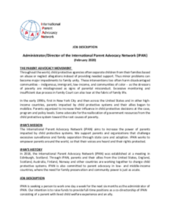Displaying 731 - 740 of 2509
This article from ABC News describes the impacts the COVID-19 crisis has had on families in the US whose children are in foster care, including the halting of family reunifications.
The aim of this study was to examine the relationship between primary caregiver cognitive impairment (CCI) and child protection system (CPS) investigation outcomes using the Canadian Incidence Study of Reported Child Abuse and Neglect (CIS-2008).
"In this time of profound uncertainty, child welfare systems face unprecedented challenges to ensuring safety, well-being, and permanency for young people," says this joint statement.
IPAN is seeking a person to work one day a week for the next six months as the administrator of IPAN.
In this piece for the Chronicle of Social Change, Fred Wulczyn - a senior research fellow at Chapin Hall and the director of its Center for State Child Welfare Data - discusses the potential long-term impacts of the COVID-19 crisis on the U.S. child welfare system.
The Saskatchewan Youth In Care and Custody Network (SYICCN) is calling for assistance for children in government care to be kept in place until services return to pre-coronavirus levels, even if young people "age out" of those services, according to this article from CBC News.
Child protection experts are worried that school closures and self-isolation efforts in place to hamper the spread of the coronavirus in the US will put children at greater risk for abuse and violence, according to this article from ABC News.
This article from the Huffington Post describes the impacts of the COVID-19 crisis on care leavers in Canada.
During a teleconferenced hearing, U.S. District Judge Dolly Gee in Los Angeles said she wants unaccompanied and separated immigrant children to be moved out of government-contracted facilities and to ensure they are released to suitable sponsors in an orderly fashion and aren’t put in danger, according to this article from the Associated Press.
"Families and children involved with the child welfare system have begun to experience disruptions," says this article from Vox. "Courts are closing, cases are delayed, and in-person contact with social workers is severely limited. As a result, vulnerable children who are already experiencing great instability are being further destabilized."

